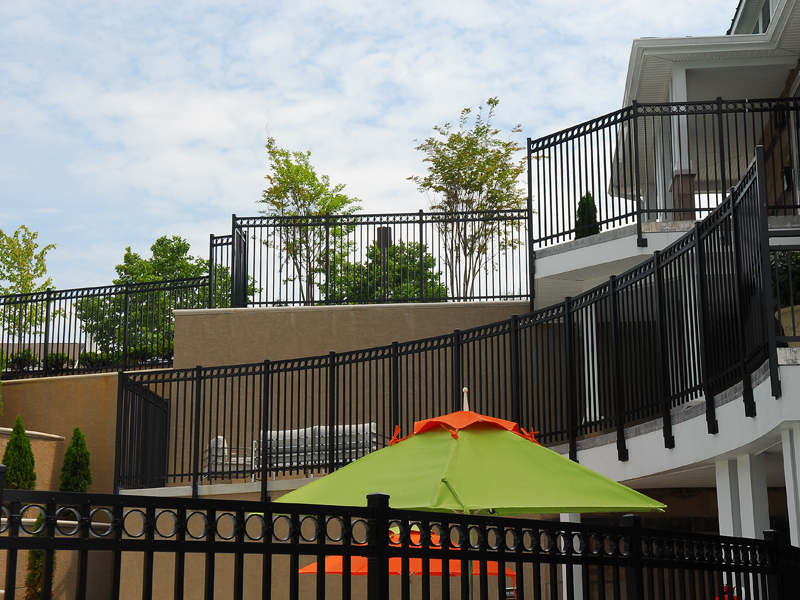To a landlord, a residential fence has a very different importance than it would to a homeowner or tenant. For landlords, fences can increase the value and appeal of a property to prospective tenants, who will frequently evaluate these features as they seek out new residences. While homeowners only need to think about curb appeal if they consider selling, landlords need to frequently keep in mind the way their property will come across to prospective tenants.
Landlords also have much less interest in investing time and energy into the maintenance and upkeep of their properties. The more properties can endure wear and tear without constant tuning and fixing, the more landlords can save on maintenance costs. Landlords also have a vested interest in the upkeep of their property to retain tenants into new lease terms. The less breakage of the property’s features, the less frustration endured by the tenants and the more likely they will maintain good relations and continued lease agreements.
In sum, landlords are generally interested in products that offer a high aesthetic value in relation to maintenance and replacement requirements. Regarding fencing, the ideal product for a landlord would be one that looks great with low upkeep and maintenance costs. In this article, we will elaborate on the special fencing concerns for rental properties and discuss the best fencing options to meet the unique needs of landlords and others who rent property.
Reasons to Install a Fence on a Rental Property
Curb Appeal
Landlords are constantly in the place of marketing their properties to potential renters. This means not only making their property appealing in general, but making it appealing to the specific renters they seek to attract. In the case of fencing, two specific groups often seek out fencing: families and pet owners. Both place a high premium on a secure, fenced-in yard and this will likely be reflected in their willingness to pay for this feature. A fence that meets the needs of potential tenants will add to the marketability and likely the market price for a rental property
Long-term Value
Even if landlords aren’t thinking of selling the property at the moment, fences can add value and desirability to the property in case they do decide to sell later. Often, a good measure of the money invested in fencing will increase the sale value of the property and make it more marketable for purchase.
Tenant Retention
Long-term tenants can prove a boon to landlords by providing consistency and relief from the time and energy invested in attracting new tenants. Landlords thus need to make their properties liveable and desirable for their current inhabitants so those good tenants will re-sign leases. Fences that provide value to tenants can be extremely useful in bringing tenants back to sign future leases.
Rental Property Fencing Considerations
Property Access
Most states in the U.S. have tenant protections that prohibit landlords from entering the property except for specific circumstances. In Washington state, for example, landlords must give at least two days’ notice for visiting the property and must visit at a reasonable time. The only cases in which landlords can enter without tenants’ consent are in the case of emergency, abandonment, or court order.
What does this mean for fencing rental properties? Fences, especially privacy fences, can restrict sightlines into the property. Most of the time, for tenants, this is a good thing, since privacy is a sought-after quality of many properties. Yet the privacy can conceal damage or other misuse in the property. With sight-restrictive fencing, landlords may not know about neglect, misuse, and dangers or liabilities on the property.
Therefore, fences must strike a balance of value to the tenant and value to the landlord. For the tenant, this means security, privacy, and beauty. While landlords are invested in these features, they also maintain an interest in seeing the property from the outside to ensure the safety and well-being of the tenants and property.
Tenant Duration
The length of time tenants spend in a rental property has an impact in the way landlords manage that asset. Longer tenants mean that landlords need to exert less energy constantly making the home marketable and appealing to prospective tenants. Tenant turnover creates an interest in the immediate aesthetics of the property.
Long-term tenants, however, needless the flashy curb appeal amenities as they do the continued durability and livability of all aspects of the property. In regards to fencing, while short-term tenants might favor a beautiful wood fence, the continued maintenance (especially staining) will prove a burden for both long-term renters and their landlords. The longer the tenant, the less reason to install fencing with high maintenance and upkeep costs.
Best Fences for Rental Properties
Vinyl
Vinyl fence is known for its durability. While it often requires more initial investment in materials and building costs, it can last for decades without maintenance or re-staining. Still, the cost of the materials can prove problematic in the case of damage to the fence. Vinyl fences can be more expensive to repair or replace than other types of fencing. Still, given the wide variety of styles and options available in vinyl, it can provide solid long-term value with minimal maintenance and upkeep costs.
Aluminum
Like vinyl, aluminum fence can be more of an investment upfront in exchange for years of stable and maintenance-free value. Aluminum, unlike steel, is less susceptible to rust and oxidation than can break down metals over time. It can also be fabricated in specific colors, lessening the need for re-painting. Moreover, aluminum is cheaper to replace and repair than vinyl, making it the ultimate option for landlords.
Whichever option you choose, you’ll want a balance of beauty, affordability, and durability. The options above are ideal in offering all of those characteristics, but others may be available as well. Keep in mind the special consideration for property owners for installing a fence, and make sure to comply with all local ordinances.
Read More:

